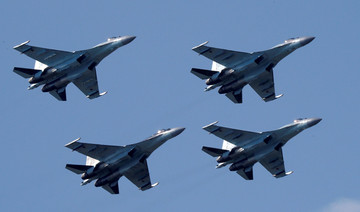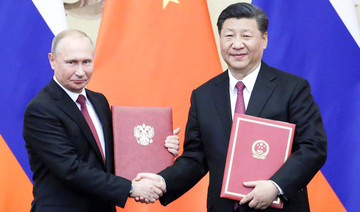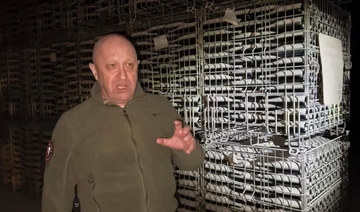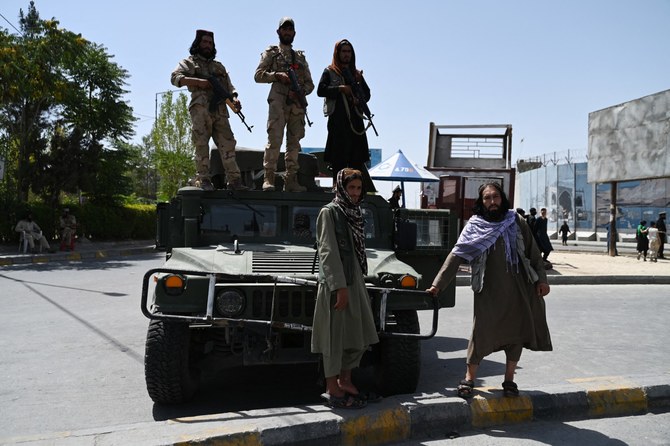NEW DELHI/WASHINGTON: The US has warned India against a planned purchase of S-400 surface-to-air missiles from Russia when President Vladimir Putin’s visits New Delhi this week, saying such an acquisition would attract sanctions under American law.
India’s military wants the missile batteries, both as a deterrent against China and to gain an edge over traditional rival, Pakistan, as they are able to track and shoot down combat aircraft, even stealth planes, at unprecedented ranges.
India and Russia will sign the missile deal, estimated at more than $5 billion, during Putin’s visit for annual summit talks with Indian Prime Minister Narendra Modi beginning on Thursday, a Kremlin aide said.
But the US has warned countries trading with Russia’s defense and intelligence sectors they would face automatic sanctions under a sweeping legislation called Countering America’s Adversaries Through Sanctions Act (CAATSA) that President Donald Trump signed into law last August.
The law is designed to punish Putin for the 2014 annexation of Crimea from Ukraine, involvement in the Syrian civil war and meddling in the 2016 US presidential election.
“We urge all of our allies and partners to forgo transactions with Russia that would trigger sanctions under the CAATSA,” a US State Department representative said.
“The administration has indicated that a focus area for the implementation of CAATSA Section 231 is new or qualitative upgrades in capability – including the S-400 air and missile defense system.”
Last month, the US imposed sanctions on China’s military for its purchase of combat fighters as well as the S-400 missile system it bought from Russia this year.
The US is also concerned about NATO ally Turkey’s decision to buy the Russian missile system, seeing it as incompatible with the alliance systems.
Modi’s government, caught in the US-Russia crossfire, hopes the Trump administration will give it a pass on the proposed arms transfer from Russia, officials in New Delhi said.
Defense Minister Nirmala Sitharaman told reporters India was closing in on the deal to buy the air defense system from Russia, with which it has long-standing military ties.
“Negotiation on S-400 air defense systems has been on for a long while and it is at a stage where it can be finalized,” Sitharaman said last week. “We have a big legacy of buying defense equipment from Russia.”
More than 80 percent of India’s military equipment was of Soviet origin during the days of the Cold War, but since its breakup New Delhi has diversified its weaponry.
The US is one of its top arms suppliers, closing $15 billion worth of deals in just the last decade.
US firms Lockheed Martin and Boeing lead the race to sell the Indian military hundreds of aircraft to replace its aging Russian MiG planes.
The Modi government hopes the Trump administration will not disrupt burgeoning defense ties with the world’s biggest arm importer by levying sanctions the US Congress has sought.
The Trump administration faced competing pressures from Congress pursuing a hard line on Russia, said Jeff Smith, a specialist on South Asia at the Heritage Foundation.
“The administration was critical of the CAATSA and fought hard for a national security waiver at the cabinet secretary level but was denied by Congress,” he said.
“The administration is not only trying to navigate competing geopolitical interests but relatively stringent conditions imposed by a Congress determined to tie its hands on Russia policy.”
India risks US sanctions with $5bn purchase of Russian missiles
India risks US sanctions with $5bn purchase of Russian missiles
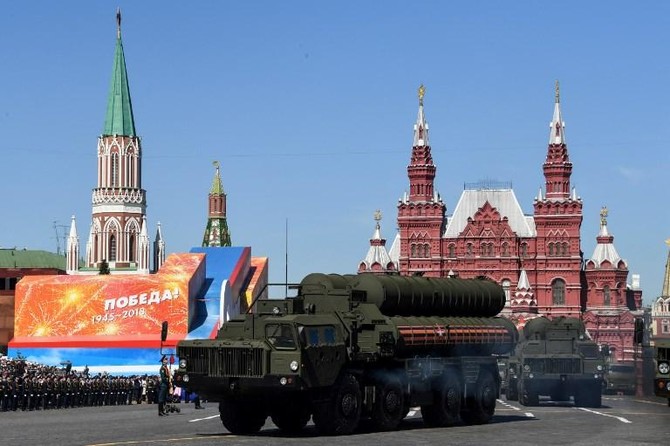
- India’s military wants the missile batteries, both as a deterrent against China and to gain an edge over traditional rival Pakistan
- The US has warned countries trading with Russia’s defense and intelligence sectors they would face automatic sanctions
UK says to expel Russian defense attache as ‘undeclared military intelligence officer’
- Interior minister James Cleverly told parliament the UK would also remove the diplomatic status of several Russian-owned properties
- UK is currently a staunch NATO backer of Ukraine
Interior minister James Cleverly told parliament the UK would also remove the diplomatic status of several Russian-owned properties, including one in Sussex, southern England, and another in London “which we believe have been used for intelligence purposes.”
There would also be new restrictions on Russian diplomatic visas such as a cap on the length of time Russian diplomats can spend in the UK, he added.
The move comes with the UK concerned at an apparent increase in “malign” Russian activity on UK soil, including an arson attack on a Ukrainian-linked business allegedly orchestrated by the Kremlin.
A British man who it is claimed has links to the Wagner Group was charged in connection with that case last month.
London has previously accused Moscow of being behind the poisoning of two Russian former agents on UK soil, and of a spate of cyberattacks and disinformation campaigns.
The UK is currently a staunch NATO backer of Ukraine, providing training for troops and military equipment in the fightback against Russia.
Cleverly said the new package of measures was intended “to make clear to Russia that we will not tolerate such apparent escalations.”
He warned that Moscow would make accusations of Russophobia and spread conspiracy theories in response to his announcement.
“This is not new and the British people and the British Government will not fall for it, and will not be taken for fools by (President Vladimir) Putin’s bots, trolls and lackeys.
“Russia’s explanation was totally inadequate. Our response will be resolute and firm.
“Our message to Russia is clear: stop this illegal war, withdraw your troops from Ukraine, cease this malign activity.”
Four arrested for duping young Indian men into fighting for Russia in Ukraine
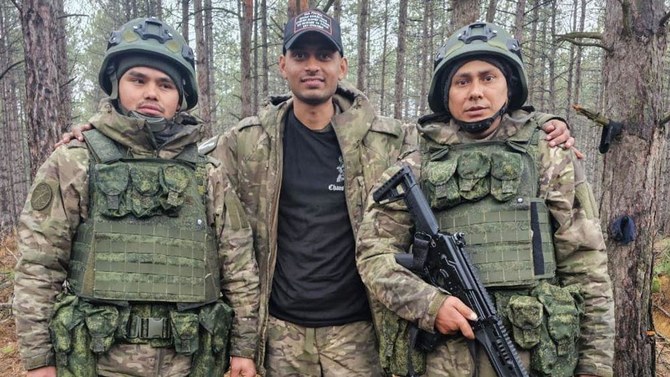
- Families of two Indian men who were killed in the war said that they had gone to Russia expecting to work as ‘helpers’ in the army
- At least 200 Nepalis are estimated to be serving in the Russian army and about 100 are missing
NEW DELHI: Indian police said four people linked to a network of human traffickers have been arrested on suspicion of luring young men to Russia with the promise of lucrative jobs or university places only to force them to fight in the war in Ukraine.
About 35 Indian men were duped in this manner, the Central Bureau of Investigation (CBI) said in March.
The four Indian nationals arrested were a translator, a person facilitating visa processing and the booking of airline tickets as well as two “main recruiters” for the southern states of Kerala and Tamil Nadu, the CBI said late on Tuesday.
The investigation “is continuing against other accused persons who are part of this international network of human traffickers,” the CBI said.
The families of two Indian men who were killed in the war have told Reuters they had gone to Russia expecting to work as “helpers” in the army.
India’s foreign ministry says each case has been “strongly taken up” with Russia. Moscow has not responded to repeated requests from Reuters for comment.
Other South Asian countries have also warned their citizens against such trafficking networks after multiple cases emerged of people being similarly duped into fighting in the Russian army.
Sri Lanka said on Wednesday that “a number” of its retired war veterans were lured to the Russia-Ukraine war front with the promise of a “handsome salary,” citizenship, and other benefits for serving in the army, none of which were granted.
“A significant number of war veterans have died and sustained injuries on the battlefield,” Sri Lanka’s Defense Ministry said, adding that the law would be “strictly enforced” in the matter.
A retired major and an employment agent have been arrested in this connection.
Nepal, which paused issuing work permits for Russia and Ukraine in January, has said several young unemployed Nepalis had been illegally recruited into the Russian army by agents who charged them hefty sums for visas.
At least 200 Nepalis are estimated to be serving in the Russian army and about 100 are missing, officials have said.
India has refused to condemn Russia over the war, calling instead for dialogue and diplomacy to end the conflict. The two countries have enjoyed a close relationship for decades, trading in items from fighter jets to tea.
India has also increased its purchase of cheap Russian oil since the war, with Moscow emerging as its top oil supplier in the last financial year for the second year in a row.
Police clearing Pro-Palestinian tent encampment at George Washington University, dozens arrested
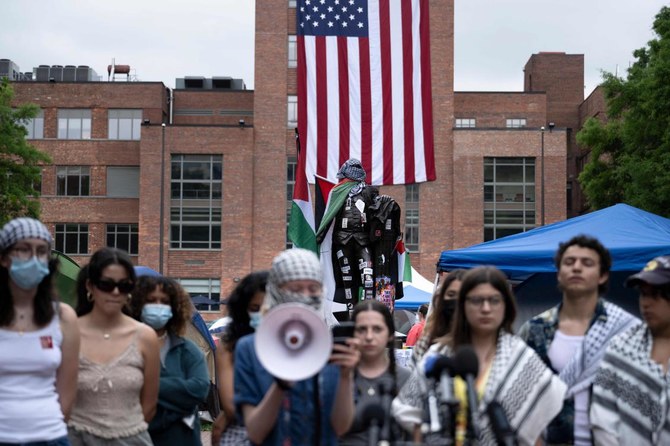
- A pro-Palestinian tent encampment was cleared at the University of Chicago on Tuesdday
- Tensions have continued to ratchet up in standoffs with protesters on campuses across the US
WASHINGTON: Police began to clear a Pro-Palestinian tent encampment at George Washington University early Wednesday and arrested dozens of protesters, hours after dozens left the site and marched to President Ellen Granberg’s home.
Officials at the university in Washington, D.C., had warned of possible suspensions for students engaging in protest activities on University Yard.
“While the university is committed to protecting students’ rights to free expression, the encampment had evolved into an unlawful activity, with participants in direct violation of multiple university policies and city regulations,” the university said in a statement.
Local media had reported that some protesters were pepper sprayed as police stopped them from entering the encampment and nearly 30 people had been arrested, according to community organizers.
In a statement, the District of Columbia’s Metropolitan Police Department said arrests were made for assault on a police officer and unlawful entry, but a number of arrests wasn’t immediately given. The department said it moved to disperse demonstrators because “there has been a gradual escalation in the volatility of the protest.”
Tuesday evening, protesters carrying signs that read, “Free Palestine” and “Hands off Rafah,” marched to Granberg’s home. Police were called to maintain the crowd. No arrests were made.
This comes as Mayor Muriel Bowser and MPD Chief Pamela Smith are set to testify about the District of Columbia’s handling of the protest at a House Committee on Oversight and Accountability hearing on Wednesday afternoon.
A pro-Palestinian tent encampment was cleared at the University of Chicago on Tuesday after administrators who had initially adopted a permissive approach said the protest had crossed a line and caused growing concerns about safety.
University President Paul Alivizatos acknowledged the school’s role as a protector of freedom of speech after officers in riot gear blocked access to the school’s Quad but also took an enough-is-enough stance.
“The university remains a place where dissenting voices have many avenues to express themselves, but we cannot enable an environment where the expression of some dominates and disrupts the healthy functioning of the community for the rest,” Alivizatos wrote in a message to the university community.
Tensions have continued to ratchet up in standoffs with protesters on campuses across the US — and increasingly, in Europe — nearly three weeks into a movement launched by a protest at Columbia University. Some colleges cracked down immediately on protests against the Israel-Hamas war. Among those that have tolerated the tent encampments, some have begun to lose patience and call in police over concerns about disruptions to campus life, safety and the involvement of nonstudents.
Since April 18, just over 2,600 people have been arrested on 50 campuses, figures based on AP reporting and statements from universities and law enforcement agencies.
But not all schools are taking that approach, with some letting protesters hold rallies and organize their encampments as they see fit.
The president of Wesleyan University, a liberal arts school in Connecticut, has commended the on-campus demonstration — which includes a pro-Palestinian tent encampment — as an act of political expression. The camp there has grown from about 20 tents a week ago to more than 100.
“The protesters’ cause is important — bringing attention to the killing of innocent people,” university President Michael Roth wrote to the campus community Thursday. “And we continue to make space for them to do so, as long as that space is not disruptive to campus operations.”
The Rhode Island School of Design, where students started occupying a building Monday, affirms students’ rights to freedom of speech and peaceful assembly and supports all members of the community, a spokesperson said. The school said President Crystal Williams spent more than five hours with the protesters that evening discussing their demands.
On Tuesday the school announced it was relocating classes that were scheduled to take place in the building. It was covered with posters reading “Free Palestine” and “Let Gaza Live,” and dove was drawn in colored chalk on the sidewalk.
Campuses have tried tactics from appeasement to threats of disciplinary action to resolve the protests and clear the way for commencements.
At the University of Chicago, hundreds of protesters gathered for at least eight days until administrators warned them Friday to leave or face removal. On Tuesday, law enforcement dismantled the encampment.
Officers later picked up a barricade erected to keep protesters out of the Quad and moved it toward the demonstrators, some of whom chanted, “Up, up with liberation. Down, down with occupation!” Police and protesters pushed back and forth along the barricade as the officers moved to reestablish control.
Dozens detained at Paris pro-Palestinian university protest
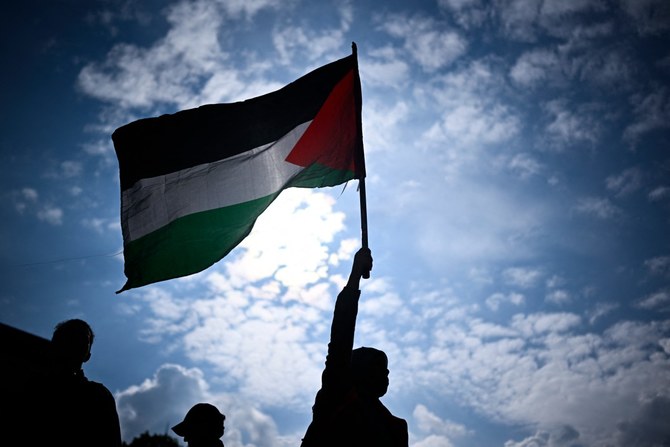
- Prime Minister Gabriel Attal said there would never be a right to disrupt France’s universities with such protests
- Police acted after about 100 students had been occupying a lecture theater for two hours
Paris: French police detained 86 people following an operation to remove students staging a pro-Palestinian occupation at the Sorbonne university in Paris, prosecutors said Wednesday.
Those arrested in the police operation on Tuesday night were being held for a variety of public order offenses, said the statement.
They include wilful damage, rebellion, violence against a person holding public authority, intrusion into an education establishment and holding a meeting designed to disrupt order. Some are also being held for participation in a group with a view to preparing violence or damage to property.
They can be held for an initial 24 hours, which can then be extended another 24 hours.
The day before police moved in, Prime Minister Gabriel Attal said there would never be a right to disrupt France’s universities with such protests.
Police acted after about 100 students had been occupying a lecture theater for two hours in “solidarity” with the people of Gaza, an AFP journalist on site noted.
Tuesday night’s police operation at the Sorbonne — and at another university on Paris’s Left Bank, Science Po university — followed interventions to end similar protests at the end of April.
Students at universities in several European countries have followed the actions on US campuses where demonstrators have occupied halls and facilities to demand an end to partnerships with Israeli institutions because of Israel’s punishing assault on Gaza.
Police have also intervened to clear campuses in the United States, Netherlands and Switzerland.
Palestinian militant group Hamas on October 7 attacked southern Israel, resulting in the deaths of about 1,170 people, mostly civilians, according to an AFP tally of Israeli official figures.
Israel estimates that 129 hostages seized on October 7, out of the 253 taken, are still being held in Gaza, including 34 the military says are dead.
Israel’s retaliatory offensive has killed at least 34,789 people in Gaza, mostly women and children, according to the health ministry in the Hamas-run besieged Palestinian territory.


